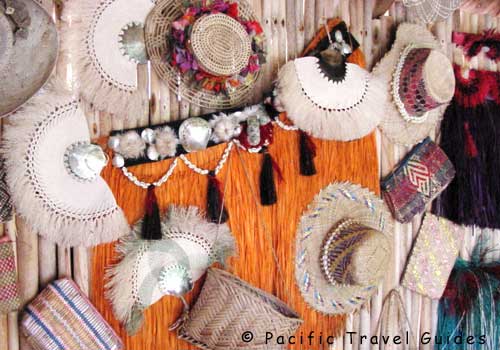Cook Islands culture is renowned for its enchanting dancing and upbeat drumming from which its legends and oral history has derived from.
Pictures of Cook Islands Culture
Culture in the Cook Islands
Cook Islands history starts about 500AD when the islands are first believed to be settled by a migration that left from western French Polynesia. The ancient Cook Island Maoris believed in ancestral gods and the community was held together by the ruling chief or ariki and the priest or ta'unga both of which were hereditary titles, usually passing through the male lineage. The ariki and ta'unga were reveered as having supernatural powers referred to as mana and this mana could be increased from consuming their enemies in war. Cannibalism and warfare were thus common practice. Sub chiefs were responsible for smaller collections of families within a village.
The islanders were experienced sea navigators and travelled between islands in large double-hulled catamarans that could accommodate up to 60 people. They navigated using the stars, cloud patterns and the swell, temperature and currents of the sea. When looking for new islands they would take frigate birds with them and on their release, follow their direction to find land. Seven such canoes departed from Ngatangiia Harbour on the east coast of Rarotonga and eventually reached New Zealand to colonise the islands. Knowledge of these sea-faring voyages were passed on in the form of chants.
There are no written accounts of pre-Christian history, so most of what we know now comes through the words and actions of traditional dances and through examining the archaeological marae (spiritual meeting places) that lay in ruins around the islands. The Maoris practised body tattooing as a form of identity, markings based on the descendancy of ones heritage.
In 1595, Pukapuka in the northern group was sighted by Alvarano de Mendana of Spain. In 1773, on his second Pacific voyage, Captain Cook sighted Manuae and named it Hervey's Island which was applied to the entire Southern Group after more sightings. It wasn't 1824 that the islands were named the Cook Islands in his honour. Following the explorers came the missionaries and blackbirders bringing with them Christianity and new diseases. Within time the Maoris were clothed, their religious beliefs abolished and traditions abandoned. Kava drinking was forbidden, and today is one of the few South Pacific Islands where it is still not practised. Instead, alcohol brewed from oranges became popular and today the "bush-beer" schools still thrive on Atiu.
In 1888, the ariki on Rarotonga pronounced the islands a British protectorate on hearing the French were voyaging to claim the islands from themselves. For 14 years, the islands were administered from New Zealand and in 1901 the Cooks finally became annexed to New Zealand and the power of the ariki was removed. In 1965, the islands attained independence in the form of internal self-governance in association with New Zealand. Cook Islanders remain New Zealand citizens.














